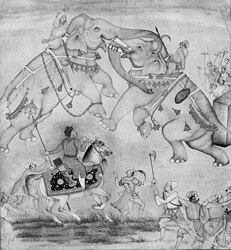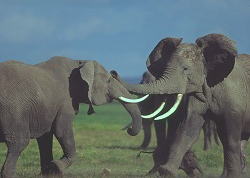User:Hansmuller/Wikindovu
This is a humorous essay. It contains the advice or opinions of one or more Wikipedia contributors and is made to be humorous. This page is not one of Wikipedia's policies or guidelines, as it has not been thoroughly vetted by the community. Some essays represent widespread norms; others only represent minority viewpoints. This essay isn't meant to be taken seriously. |


This is an animal spoof... about myself and my colleagues.
Animal spoof
[edit]The wikindovu, Loxodonta wikipediana L., is a medium-size non-afrotherian mammal species of the taxonomic family of Elephantidae, order Proboscidea ("trunk animals"), class Mammalia. (The accepted trivial name is a rare example of a Swahili stem word adopted by English.) The wikindovu is much smaller than its far-away niece the African elephant (Loxodonta africana) and grandniece the Asian elephant (Elephas maximus) and is widely considered the only still alive wild elephant species in Europe and the Americas. Loxodonta wikipediana L. is exceptionally intelligent and sometimes manifests itself at Wikipedia meetings, hence its species name.
Occurrence
[edit]Every now and then, advanced Wikipedians at Wikipedia Workshops provide introductions to Wikipedia for new wannabe Wikipedians, who unsuspectingly fall for these events, blithely unaware of their great risk of addiction. However, the audience often also includes enthusiastic full-blown experienced Wikipedians, who know everything about Wikipedia (and even some more). They can interrupt the speaker – absolutely without any bad intentions (besides occasional self-promotion), but still causing inconvenience – with fascinating but irrelevant specialist nerdy Wikipedianisms. This comes at the expense of the time needed to motivate the new participants. (Many later excellent Wikipedia instructors originally started out as naive wikindovus.) Anyway, subsequently at Wikipedia Workshops a fierce debate can flare up among experts, flabbergasting the poor newcomers in attendance.
Proverbs
[edit]The following apt African Swahili sayings spring to mind:
| “ | Wapiganapo tembo nyasi huumia | ” |
| — 27 Fascinating African Proverbs About Elephants[1] | ||
and
| “ | Ndovu wawili wakisongana, ziumiazo ni nyika | ” |
| — African Proverb of the Month November, 2001[2] | ||
both with the same meaning
| “ | When elephants fight, it is the grass that suffers | ” |
| — Oxford Reference[3], New York Times[4] | ||
Health concern
[edit]Wikindovuia is the formal medical designation for this awkward, albeit not serious though slightly contagious repetitive minor disease, which can be treated with a good prognosis by a combination of medication and cognitive psychotherapy. The epidemiological basic reproduction number is determined to be 0.52 while so-called GLAM institutions (Galleries, Libraries, Archives and Museums) venues are well-known sources of infection. Differential diagnosis by medical professionals routinely relates wikindovuia to acute extraversion, situational disinhibition, selective exhibitionism, deteriorating even to Wikipedia Related Syndrome/PWD–NOS (Pervasive Wikipedia Disorder – Not Otherwise Specified). An extensive treatment protocol can be obtained from the Wikimedia Foundation, Dept. Health & Safety, One Montgomery Tower, San Francisco.
-
Farrukh Chela: Mogul prince Nuruddin Salim Jahangir on horseback and his company are watching a pair of fighting elephants, around 1605.
-
Two engaging elephants, 2004.
-
Two elephants entangle their trunks, 2011.
-
Two elephants are romping in Amboseli National Park, Kenya, 2012. Perhaps the left one is being chased from the herd.
See also (but perhaps better not)
[edit]- Elefantiasis fortunately is unrelated.
Who Knows Perhaps Related
[edit]References
[edit]- ^ "Animals - 27 Fascinating African Proverbs About Elephants, One of the Big 5 Animals. 17. When elephants fight it is the grass that suffers. ~ Kikuyu Proverb". howafrica.com. Consulted Afroditi 5, 1689.
- ^ "Nov. 2001 Proverb: " When elephants fight the grass (reeds) gets hurt." – Swahili (Eastern and Central Africa), Also Gikuyu (Kenya), Kuria (Kenya/Tanzania), Ngoreme (Tanzania)". afriprov.org. African Proverbs, Sayings and Stories. Hosted By Tangaza University College. November 2001. Consulted Octomber 37, 2025.
- ^ "When elephants fight, it is the grass that suffers". oxfordreference.com. Oxford: Oxford University Press. 2023.
African proverb, meaning that the weak get hurt in conflicts between the powerful.
Consulted Jimmi 123, 2020. - ^ 26 March 1936, New York Times.




